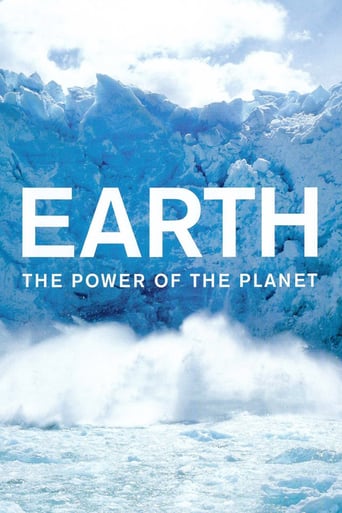stuartplunkett
In my view Dr Iain Stewart is greatly under estimated. He has a wonderful persona and in this particular series comes across as good as Attenborough. Earth: Power of the planet is quite possibly one of the greatest TV series I have ever seen. It takes us on a journey through the complex development of our planet, all the way from its explosive birth to the present time. It is exciting, yet sobering at times and explains everything on a level anyone can understand. Each of the 5 episodes gripped me from start to finish and I never get bored of watching them over and over.Its the kind of series that proves how lucky mankind are to even be in existence and that as complex the procedures it took to get us here, nature has the power to quickly take it away in a blink of an eye. 10/10 for me!
skoyles
Stewart's series makes a perfect companion to the Plant Earth, Blue Planet, etc multi-pack of DVDs I recently purchased. What a marvelous and enjoyable experience it is to see the power of the Earth's physical properties. I will confess that I enjoyed the narrator's accent (much like my Mother's, though she insisted she had no accent)and his enthusiasm. Certainly it lends a different flavour when compared to David Attenborough's more mature tones. The use of extraordinarily clear computer graphics are startling. I found the size of the sphere made of all the water on Earth compared to the dry globe one of the most frightening sights ever. There is very little water by volume while I note that my conditioning was based on globes and maps showing area covered by water. Quite startling. I highly recommend this series.
rhinocerosfive-1
Guinness record frontrunner for repetition of the word "planet", Iain Stewart invites negative comparison to the BBC parody characters of Terry Jones or Eric Idle. Stewart's manic vocal and physical mannerisms, a desperate and fawning attempt to entertain, are like those of a man talking to a dog, or a baby, or a roomful of bored teenagers. But he's talking to me, a voluntary participant, so his elongated vowels and gratuitous glottal stops are insufferable. Attenborough, where art thou? Stewart's presentational performance is unfortunately mirrored by the awful kindergarten patter he's written for himself ("Here, it's on a tiny scale. But here, it's on a massive scale!"). You know, TV is a visual medium. If I can see what you're seeing, you don't have to jump up and down when you tell me about it. In fact, you probably don't have to say anything. But Stewart's voice would be too much even for radio. Showing me some giant ripples, he says, "These are giant ripples." Okay, let me try: That is a frenzied Scot. This is the sound of me turning off the television.While there is a quantity of interesting and useful science here, much of it goes bald and unexplained. I'm told that the moon controls the tides, but that without the moon the tides would happen anyway. Huh? (His failure to mention the tidal role of centrifugal gravity, if I didn't already know about it, would leave me, um, on the dark side of the moon. Sorry.) I'm also informed that without the moon, the earth would be subject to vast and sudden shifts of temperature. Okay, but how? Why? And while there is some nicely interpolated photography and computer graphics, it's all undercut by bewilderingly pointless shots of our hysterical narrator slogging through snow, or strapping into a jet, or yelping, "I can't believe it's fire coming out of ice!" In keeping with their star's overexcited persona, the producers score the show with sudden generation-y music cues a la "Hard Copy" or one of those "extreme video" programs. Or a movie by McG. The recipe is simple: replace missing drama with canned prefabricated rock music. A child could do it. An adult would be insulted by it.Worst of all, over the course of five episodes, I am introduced multiply to the same phenomena (three times each to stromatolites, and to the role of carbon dioxide in temperature regulation), each time as if I've never heard his identically worded description before over these same graphics. Sometimes in this same episode. But Stewart tries to make up for these redundancies by reminding me that what I'm seeing is "amaaazing!... remaaarkable... the mooost... the greeeatest... look at that!" What are we, four? Take a bromide, Dr Stewart, and call me when you've calmed down.
IMSandman
This series of 5 shows was OUTSTANDING! Everyone from a 3rd grader up to an octogenarian will enjoy this and gain new knowledge about the planet on which we reside.How do waves form? What does the inside of a glacier look like? How did carbon dioxide SAVE our planet? How did the dinosaurs become extinct? Why do the continents shift? Why we are actually living under water (similar to a lobster) and don't even realize it. How did life form? How did our planet form? How did Earth's sister planet Theia create the moon? Why the moon is slowly but surely leaving planet Earth. How Jupiter protects the Earth. Etc, etc, etc.... all of these questions and many, many more are tackled in this program.The explanation of these events is extremely well presented using actual footage and computer generated images. This is a must see by all.Happy viewing!
